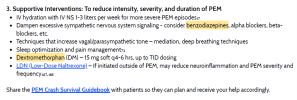@nataliezzz,
Sorry to sound dismissive, but there are reasons for everyone being sceptical here.
Most of us do not use social media - I don't even know what Blue Sky is - and many specifically prefer not to have anything to do with X. It is hard to find what the theory really is from your first post but it seems to be, in plain English, something like "all chronic unexplained illnesses like FM and MECFS are due to narrowing of the trachea, glottis or pharynx".
Hi Dr. Edwards,
I have gotten feedback from multiple people that sharing the Bluesky thread is not preferred/accessible (I thought it was a good way to go since I had laid everything out in great detail there with visuals/etc.). I am going to come back to this post soon and describe the theory in better detail with links to the literature here so it is accessible to people here. So maybe we can pick up this discussion again next week after I have had some time to do that. However, in the meantime:
The theory is not that "all chronic unexplained illnesses like FM & ME/CFS are due to narrowing of the trachea, glottis or pharynx." The theory is that these illnesses are due to a stress response/sensitization in the limbic system of the brain to inspiratory flow limitation during sleep which was triggered by HPA axis activation by a stressor (e.g. infection). It provides a possible explanation for how people can develop an identical syndrome (ME/CFS) after any viral or bacterial infection but also other diverse stressors like surgery, physical/psychological trauma, pregnancy/childbirth, chemical exposures, and on and on (like I said to someone else, I don't buy the notion that people who developed ME/CFS suddenly after a car crash or surgery simultaneously acquired an asymptomatic infection which was the actual trigger for their ME/CFS). It can also provide an explanation for many other observations about ME/CFS: significant fluctuations in symptoms even on a day-to-day/hour-to-hour basis, PEM being able to be triggered by things like emotional distress and sensory input alone, symptoms of PEM & severe ME/CFS being able to be rapidly and dramatically reduced by benzodiazepines, the hypermobility/EDS connection (which you seem skeptical is real? I thought there were actual studies demonstrating it but not sure).
Millions of people have inspiratory flow limitation (with or without OSA - apnea/hypopnea index [AHI] > 5) with no daytime fatigue/sleepiness. It is well recognized that the majority of people with OSA are asymptomatic. And yet, both OSA & snoring (= inspiratory flow limitation, though you can have inspiratory flow limitation without audible snoring) in the absence of OSA are shown by large population-level data (see links below) to be associated with daytime sleepiness (by the way almost everyone with OSA snores, so which is more associated with sleepiness: OSA or snoring?). And it has also been demonstrated that people with OSA syndrome (OSA + daytime fatigue/sleepiness) and UARS (AHI <5 with inspiratory flow limitation + daytime fatigue/sleepiness) have reduction in their daytime fatigue/sleepiness with CPAP treatment. The symptoms of UARS & OSAS are not caused by narrowing/collapse of the airway alone (otherwise everyone with OSA would be symptomatic); they are caused by narrowing/collapse of the airway
+ something else (& Dr. Gold's theory is that is a stress response in the brain to inspiratory flow limitation).
https://www.atsjournals.org/doi/10.1164/ajrccm.159.2.9804051
https://www.nejm.org/doi/full/10.1056/NEJM199304293281704
https://www.atsjournals.org/doi/10.1164/ajrccm.162.4.9911073
To make a start on testing that we would need some evidence that there was a striking difference between all people with these illnesses and everyone else, using a blinded study of a cohort that was not selected by attendance at clinics that might have biased samples. Is there any such evidence?
Science begins with an observation, and then you do those types of studies. As I said, Dr. Gold is primarily a clinician (not a researcher) which is part of the reason he figured this out. He had an observation: alpha-delta sleep (abnormal intrusion of alpha waves [associated with relaxed wakefulness] into delta wave/deep sleep) - an objective finding well recognized to be associated with fibromyalgia - in many of his UARS patients who did not have a diagnosis of fibromyalgia. He also noticed that many of his UARS patients complained of "functional somatic syndrome" symptoms. Dr. Gold's studies + the other studies from other authors in my thread + the fibromyalgia case reports from other authors (with one having the objective finding of alpha-delta sleep disappearing along with fibromyalgia symptoms when the patient's sleep-disordered breathing was treated) provide more than enough supporting data to call for a large study.
But here is a study (not from Dr. Gold) where a rheumatology clinic offered polysomnography to consecutive female (ACR criteria meeting) fibromyalgia patients who were not specifically complaining of sleep disturbances; 40% (23) agreed and all 23 had OSA, with 19/23 (83%) having an AHI >15. That does not happen by chance - the prevalence of OSA (AHI ≥ 5) in women in the general population based on epidemiological studies is ~15-20%.
Sleep-disordered breathing among women with fibromyalgia syndrome
Obstructive sleep apnea is a common disorder in the population—a review on the epidemiology of sleep apnea
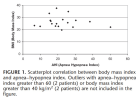
Beyond that the theory seems to slip into the pseudoscientific language of psychology - things like 'dysfunctional stress response' - of the sort popular with the therapy professions who have been instrumental in pretending to treat ME/CFS while in reality making peoples' lives a misery. Language of this sort is too vague to be of any scientific use and anyway nobody should be suggesting treating people on the basis of a theory without adequate trials. In this respect Dr Gold appears to be exactly like Wessely and Chalder on the CBT side and equally the hypermobility physicians who have built up the story that somehow chronic fatigue is linked to 'hEDS', which then got linked to ME/CFS by the psychologists who think ME/CFS is chronic fatigue.
I don't think Dr. Gold is anything like Wessely and Chalder. Like I said, he was just a clinician who had an observation (alpha-delta sleep and "functional somatic syndrome" symptoms in many of his UARS patients) and pursued some small studies in Gulf War illness & fibromyalgia patients to investigate if sleep-disordered breathing could be causing the symptoms of fibro/GWI and then published
his theory in Sleep Medicine Reviews so researchers in sleep medicine would hopefully call for larger-scale studies (they didn't).
At one level we can be certain that all ME/CFS symptoms are generated in the brain. But we need to understand the specific causal pathways that lead to that - which are likely to be both inside and outside the brain (airway obstruction isn't in the brain). I (and many researchers) think it is very likely that ME/CFS symptoms have nothing much to do with mitochondria or metabolism, but building a theory requires proposing specific alternative pathways. And you are never going to know the theory is right until you have tested it therapeutically with an adequately controlled study.
Glad we would both agree ME/CFS symptoms begin in the brain! Airway obstruction isn't in the brain, but a stress response to inspiratory flow limitation during sleep (which the evidence points to being the primary cause of fatigue/sleepiness in sleep-disordered breathing patients - I'll be going into this when I update my post) could be. We haven't actually visualized it with fMRI etc. but there is evidence that points to it.
There was a small controlled study. 18 GWI patients had 96%±5 of their breaths flow limited while 11 age/BMI-matched asymptomatic Gulf War vets had 36±25% of their breaths flow limited (p = <.0001). The GWI patients treated with CPAP experienced improvements in the symptoms of GWI (fatigue, pain, cognitive dysfunction, etc.) which were highly and significantly correlated with changes in an objective finding (decreased sleep stage shifts) in all patients (GWI patients on sham CPAP did not experience decreased sleep stage shifts & got slightly worse). This is the kind of study you call for a larger controlled trial based on! Also, Dr. Gold's fibromyalgia study did not have a control group, but one of the fibromyalgia patients who was unemployed due to symptoms and remained on CPAP returned to full employment.
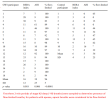
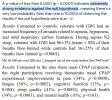
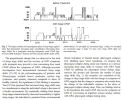
All the stuff I have seen from sleep medicine physicians since the 'specialty' became fashionable about twenty years ago has been deeply unimpressive. There is no excuse for tinkering about with treatments as 'a clinician' without doing proper trials. There is nothing worthy about that sort of behaviour.
"
Tinkering about with treatments as 'a clinician' without doing proper trials." That is not what is happening here. Dr. Gold has a lot of fibromyalgia patients referred to his department because the rheumatology department at his university has caught on to the fibromyalgia - sleep-disordered breathing connection, and he finds that they all (or almost all) have sleep-disordered breathing, and that their fibromyalgia symptoms (pain, fatigue, insomnia, IBS, etc.) improve when treated with CPAP that is properly titrated to eliminate inspiratory flow limitation (I think this is a big part of the reason why many OSAS patients don't feel [much] better on CPAP by the way - their AHI may be down, but they can still have a lot of flow limitation).
CPAP is an almost no risk treatment and it is the established treatment for OSAS/UARS (sleep-disordered breathing + daytime fatigue/sleepiness), which he finds to be present in all/close to all the fibromyalgia patients he sees. This is exactly what a clinician does - treats people for a disorder they have. There is nothing questionable about this at all.





